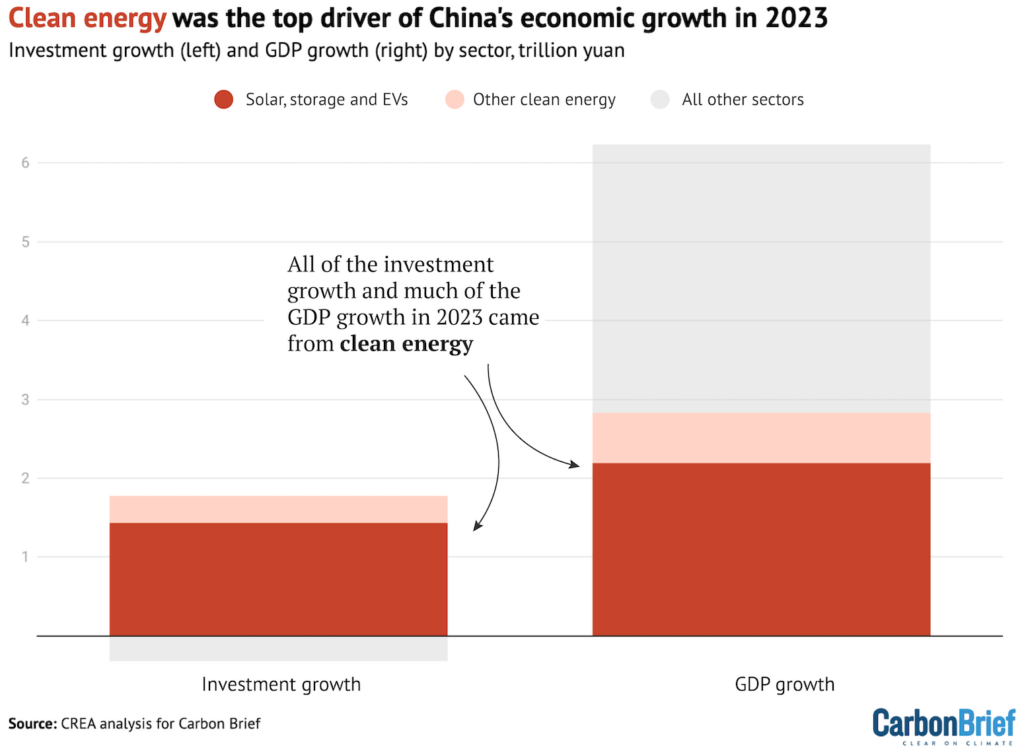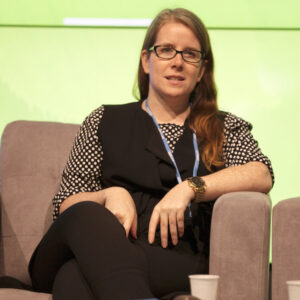
DeBriefed 26 January 2024: EU eyes ‘ambitious’ 2040 target; IPCC decides on new climate reports; Gender inequality at COPs
Yanine Quiroz
01.26.24Yanine Quiroz
26.01.2024 | 2:22pmWelcome to Carbon Brief’s DeBriefed.
An essential guide to the week’s key developments relating to climate change.
This is an online version of Carbon Brief’s weekly DeBriefed email newsletter. Subscribe for free here.
This week
EU 2040 target
AMBITION: Major EU economies – including Germany, France, the Netherlands and Spain – have called for the European Commission to set “an ambitious climate target for 2040”, in a letter obtained by Politico. While the memo does not mention a specific percentage reduction, Politico said “its rhetoric implies…that the countries would back a push to cut at least 90% of the EU’s emissions by 2040”. This is the minimum level recommended by EU science advisers.
TRILLION-EURO TARGET: The memo comes after the Financial Times reported on a draft document from Brussels detailing how the bloc can cut its emissions by 90% by 2040 and reach net-zero by 2050. The document says the EU must invest around €1.5tn a year from 2031 in order to meet its goals, according to the FT, adding that this would unlock savings of up to €2.8tn by lowering demand for fossil-fuel imports. Reuters also covered the draft, reporting that it says that EU fossil-fuel use could drop 80% on 1990 levels by 2040 under the proposals.
BREWING BACKLASH?: Meanwhile, a second Reuters story reported on the results of a cross-EU opinion poll suggesting that populist, right-wing parties could surge in the next set of European elections, which “could make passing ambitious climate change policies harder”. The Guardian also reported on how populist “anti-European” party gains in European elections “could shift the parliament’s balance sharply to the right and jeopardise key pillars of the EU’s agenda including climate action”.
IPCC roadmap
ISTANBUL MEETING: Countries gathered for a four-day meeting in Istanbul to decide on a future roadmap for the UN Intergovernmental Panel on Climate Change (IPCC), the climate science authority responsible for producing reports aimed at helping guide global action on climate change, Carbon Brief reported. At the meeting, governments decided against a new structure for the IPCC’s next “assessment cycle”, committing instead to the traditional set of three “working group” reports and just one “special” report (on cities) over the next five years.
‘NOT THRILLED’: Reacting to the decisions, one scientist told Carbon Brief that she is “not thrilled” by the decision to produce “a whole set of working group reports again”, given they will “not say that much new”. And another said that “waiting until 2028 for the three reports and 2029 for the synthesis is too late to have an impact on decision-making”. They added: “The world will be significantly different by then.”
Around the world
- LNG PERMIT ‘PAUSE’: President Joe Biden today announced a “temporary pause” on approving new export terminals for liquified natural gas (LNG), the Financial Times reported. It said the move was “a blow to a booming industry and…a win [for] climate campaigners”
- SCEPTIC APPOINTMENT: A UK Conservative peer who was previously criticised for claiming that rising temperatures are “likely to be beneficial” has been appointed to a parliamentary committee on climate change, the Guardian reported.
- AMAZON DROUGHT: Climate change was the main driver of the Amazon rainforest’s worst drought in at least half a century, according to a World Weather Attribution analysis.
- ZIM LITHIUM: China has invested more than $1.4bn in Zimbabwe, which holds one of the world’s largest lithium reserves, to secure supplies for electric vehicle manufacturing in the past two years, Climate Home News reported. It added there was a risk that local communities are “missing out” on benefits.
- COAL FIXATION: The Third Pole reported on how India’s push for new coal production could “cast doubt” on its climate targets.
2,195TWh
The amount of power that global nuclear is projected to generate by 2025 – an all-time high, according to an International Energy Agency report covered by the Financial Times.
Latest climate research
- The frequency and extent of concurrent drought and heat events in North America occurring this century is “likely unprecedented” since at least the 16th century, according to a Science Advances paper.
- Spiders may adjust the size of their webs in response to how warming temperatures could affect the size of their prey, new research in Nature Climate Change found.
- A “brief communication” in Nature Climate Change suggested that Russia’s invasion of Ukraine could “hamper the ability to adequately describe conditions across the Arctic, thus biassing the view on Arctic change”.
(For more, see Carbon Brief’s in-depth daily summaries of the top climate news stories on Monday, Tuesday, Wednesday, Thursday and Friday.)
Captured

A new sector-by-sector analysis for Carbon Brief by the Center for Research on Energy and Clean Air looked at economic growth driven by investments in clean energy in China in 2023. Clean energies – particularly the so-called “new three” industries: solar power, electric vehicles and batteries – injected 11.4tn yuan ($1.6tn) into China’s economy, accounting for 9% of China’s GDP in 2023. The analysis made use of official figures, industry data and analyst reports. This sector is a “key part not only of China’s energy and climate efforts, but also of its broader economic and industrial policy”.
Spotlight
Gender equality in climate negotiations
This week, Carbon Brief interviews the director of the Women’s Environment and Development Organization on why women are still a minority at UN climate summits.

Last week, the president of Azerbaijan was forced to rejig the organising committee for the COP29 climate summit, after receiving a large backlash for having previously picked an all-male panel.
Carbon Brief analysis shows that COPs have been male-dominated since their inception, with delegates at the most recent summit being 38% female and 62% male.
Carbon Brief spoke to Bridget Burns, executive director of the Women’s Environment and Development Organization (WEDO). Burns has campaigned for more than a decade for the representation of women and the inclusion of gender equality in the climate negotiations outcomes.
Carbon Brief: Why is it important to have equal participation of men and women in the COP29 organising committee?
Bridget Burns: The reason why we need an equal percentage of men and women in the climate change negotiations is a matter of human rights. Representation goes well beyond just gender, [it includes] frontline communities, Indigenous peoples, who also really need to have a voice in decision-making.
The decisions will not necessarily be equitable and or effective [if] they’re not being designed by the entire population who have been impacted by [climate change].
[Women] are facing impacts differently, they have different access needs. But they also have potentially different solutions.
So even though [the COP29 hosts] have added 12 women [to the 28-strong organising committee], the fact that nobody in that room stepped back to say – “Oh! this is an all-male committee” – is deeply worrying.
Gender is just one of the challenges. It’s also a leadership committee that is full of fossil-fuel executives, which is not the type of leadership that we need in charge of the COP.
CB: What is needed to ensure that climate negotiations are really inclusive?
BB: Part of changing the nature of power, and the ways in which it showed up in our system for multiple years, [goes] beyond making room at the table. It’s to allow other folks to step up into leadership and to allow for their voices to be heard. That requires important conversations on ceding power.
There’s a lot of long-term systemic work that needs to happen. At a global level, we still need the decisions, mandates and benchmarks.
CB: Should we be talking about climate policies for women beyond their participation in climate summits?
BB: It’s hard to get gender equality discussed in the climate change negotiations. It’s even harder to take a feminist approach to climate justice. As the women and gender constituency, we always bring a feminist lens – and we’re calling for feminist climate justice.
If you are a country that is pushing for a strong gender action plan – but you are not backing that up with finance for developing countries, and you’re not backing that up with [emissions] reductions – then that’s not a feminist country.
Watch, read, listen
ELFSTEDENTOCHT: BBC Sport reported on how a much-loved skating race across frozen lakes and waterways in the Netherlands could be lost forever because of climate change.
AFRICAN DISCOURSE: In African Arguments, a group of African writers respond to a recent article focused on how “war in the Congo has kept the planet cooler” – noting that such a narrative “renders African people invisible”.
INDIGENOUS MENTAL HEALTH: A podcast by Climate Tracker explored the effects of climate change on Indigenous peoples from Jamaica and Guyana.
Coming up
- 28 January: Finland presidential election
- 29-30 January: G20 first environment and climate sustainability working group meeting, Vila do Conde, Brazil
- 30-31 January: UK Climate Change Committee COP28 key outcomes briefing report
Pick of the jobs
- UK Climate Change Committee, chief executive | Salary: Unknown. Location: UK
- Politico, energy technology reporter | Salary: Unknown. Location: Arlington, US
- Global Canopy, Claudia Comberti research assistant on Brazil and COP30 | Salary: £25,000. Location: Oxford
- The Chancery Lane Project, head of forestry, land and agriculture | Salary: £60,000-80,000. Location: Remote (must have right to work in the UK for at least two years)
DeBriefed is edited by Daisy Dunne. Please send any tips or feedback to [email protected]



